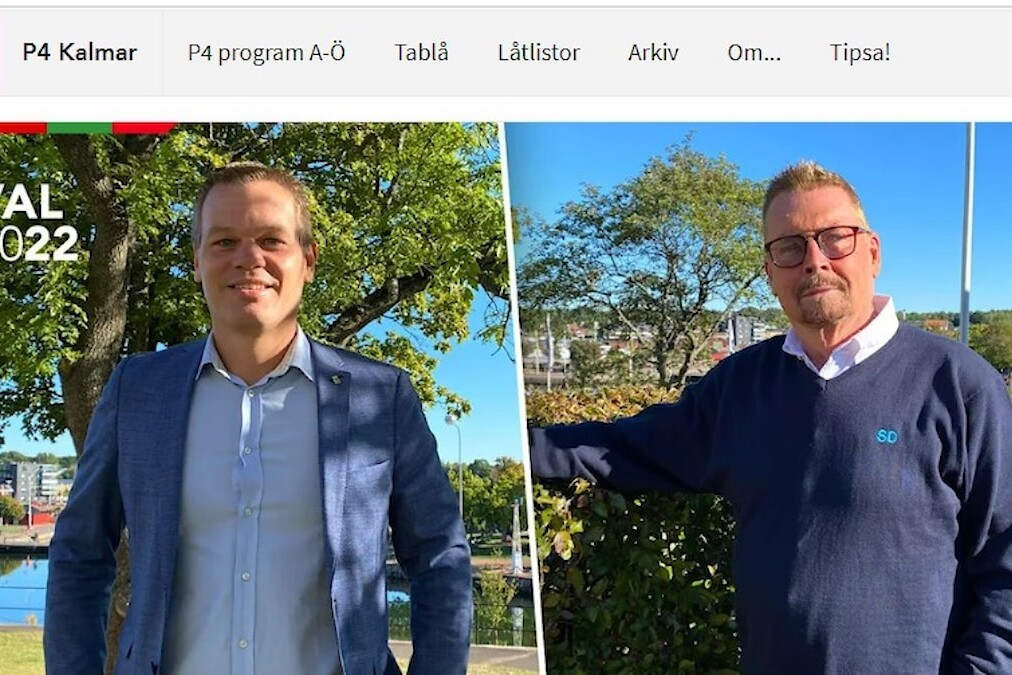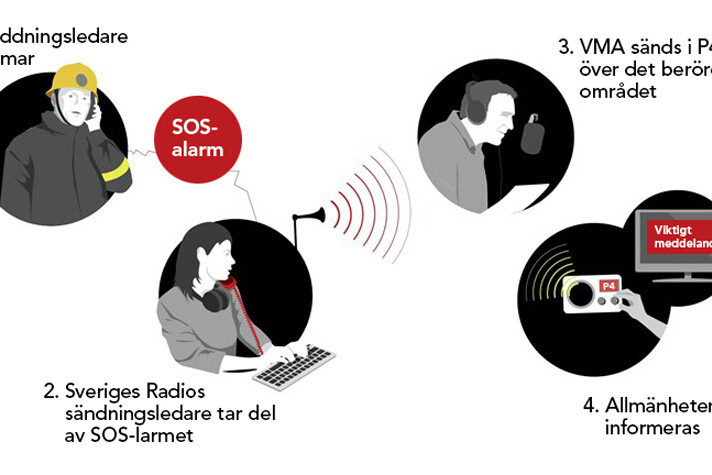INSIGHT
Information must not become a class issue
26th April 2024
Access to information must not become a class issue. This is what Swedish Radio’s CEO Cilla Benkö and Chief of Staff Gabriel Byström write after visiting the Ukrainian public service company Suspilne in Kyiv to learn lessons from operating as a media company during a long-lasting war.

This Insight was originally published on Swedish Radio and is republished with permission.
By Cilla Benkö, CEO of Swedish Radio and Gabriel Byström, Chief of Staff and Deputy CEO
At a quarter past four in the morning, the air traffic alert sounds over Kyiv. Another Russian attack has been launched. Shahed drones, hypersonic Kinzhal robots and cruise missiles spread across Ukraine. The goal is to knock out as much of the country’s electricity and heat supply as possible. Gas storage facilities are also attacked. One of the facilities that is completely destroyed is the thermal power plant Trypillia, a few miles south of Kyiv. In an interview a few days later, President Volodymyr Zelenskiy explains that there was not enough ammunition to shoot down the Russian rockets. Four Russian missiles penetrated Ukrainian air defenses at the thermal power plant and knocked it out.
In the shelter under a hotel in central Kyiv, it is quiet. Some are trying to sleep, others are scrolling on their mobiles to try to update themselves. Just before breakfast, the Russian attack is over. We return to our rooms. Kyiv is coming back to life. Children go to school, adults to their jobs. Hundreds of thousands of Ukrainians are without the electricity supply they had a few hours earlier.
We have gone to Ukraine to meet the Ukrainian public service company Suspilne, which Swedish Radio has been cooperating with since 2018. For a few days, we are visiting several cities around Ukraine. The idea is to learn from the experiences our Ukrainian colleagues have gained from working in war, a war that soon has lasted for 800 days. We meet journalists, producers, presenters, investigative reporters and technicians. We also visit a number of shelters with quickly furnished studios and workplaces to gather information on the ground for use in our work to strengthen our own ability to operate in difficult circumstances.
Some things are, of course, difficult to directly transfer to Swedish conditions, other things are sensitive for security reasons. At the same time, there are a number of overall conclusions and lessons that can be drawn from the Ukrainian experience. Some of the most important ones are:
- Electricity and mobile networks are priority targets.
The Russian attacks are increasingly directed at the electricity and telecom sectors. In order to ensure that, as a public service company, we can publish news to our audience, we must have control over the electricity supply ourselves as well as a secured access to diesel. The large mobile diesel generators at Suspilne’s disposal have been a key to securing news and information to the civilian population even when all else has been knocked out.
- The radio works when nothing else works.
Since access to electricity at times has been severely limited, there are major vulnerabilities associated with anything that requires electricity. Several of those we meet testify that during e.g. the evacuation of Kyiv and Butja it was only via radio that information could be obtained, which in many cases proved to be vital. The mobile network was out and it was also impossible to charge their mobile phones.
- The Internet is good – but insecure.
When access to electricity is good and mobile networks are working, then the mobile phone is excellent for receiving news and information. The problem is that when the electricity goes out or when the mobile networks are knocked out, the ability to keep up to date with what is happening disappears. It is not possible to rely on the fact that important messages, news or vitally important information can be obtained in a crisis situation in any other way than via terrestrial radio.
- Access to information must not become a class issue.
During parts of the war, the Starlink satellite network enabled Internet access both for the Ukrainian military and for the civilian population. The problem is that not everyone has access to Starlink. For example on the train between Poland and Ukraine there was only a good Starlink connection in first class. Further back in the train, the opportunity disappeared. As mobile coverage is severely limited and on some parts of the route non-existent, it is impossible to orientate without access to a radio. On the highway between Kyiv and Lviv, mobile coverage comes and goes, what remains then is the car radio to get news and vitally important information. In order to be able to charge their mobile phone at home during power outages, several of those we meet testify of homemade solutions with diesel generators on the balconies and diesel bought in PET bottles to power the generators. The problem is that far from everyone can buy, ship home, ensure long-term access to diesel to power their own generator.
Listen toour podcast
Uncovering and exploring the biggest
issues facing public media
- Disinformation part of the war.
The modern war is also an information war. Parallel to the war on the battlefield, an information war is taking place in many channels where disinformation and manipulation are tools to influence the outside world. On a couple of occasions, commercial Ukrainian radio channels with automated playlists have been hacked and where used to spread manipulated news, including that Volodymyr Zelenskiy was dead. Pre-recorded news means a vulnerability. Suspilne, which has decided that news is broadcast live, has on these and many other occasions been an important counterweight to Russian propaganda, manipulation and disinformation. Not least during the long frontline, the radio plays an important role in spreading credible news and countering Russian disinformation. Mobile use in the wrong place is often associated with significant risks due to the geo-location capabilities of soldiers at the front or civilians in hiding, which is not the case for news consumption via radio.
- It is important to act in time and acquire your own resources.
To be able to ensure transmissions even when bombs fall and the situation is chaotic, the ability to quickly transmit from protected locations is needed. In a short time, Suspilne has built simple but functional radio and television studios in many shelters adjacent to its regular premises all over Ukraine. In the shelters, that must be accessible within a few minutes, there is enough equipment to be able to spend many hours and being able to eat, sleep and broadcast news. On some days, evacuation to shelters takes place five or six times depending on the recurring Russian attacks. Every three months, Suspilne updates its own continuity plans in order to constantly learn from the impact of the war on its own operations. To be able to act quickly the necessary resources are required. Building sufficiently redundant solutions to cope with both peacetime crisis and war should be a matter of highest priority when it comes to resource allocation. Suspilne and the rest of Ukraine have received extensive international assistance. In the event of a possible future emergency in other parts of Europe, it can be assumed that it will be significantly more difficult to count on outside help. It is therefore important to create your own conditions to be able to handle a long-term crisis without outside help.
- Decentralisation reduces vulnerability.
Suspilne has many local stations all over Ukraine. Before and during the war, the company worked actively to reduce its vulnerability by decentralizing large parts of its operations. It requires resources, determination and flexibility, but ultimately contributes to a high level of redundancy and the ability to operate for a long time under extremely difficult conditions to ensure access to, in many cases, vital news and information.
The bombs have continued to fall on Ukraine since we left the country. Even more of the country’s electricity supply has been knocked out. At Swedish Radio, we will now quickly implement many of the experiences from our visit to Suspilne in our own contingency planning, while constantly keeping contact with our Ukrainian colleagues to assist them in the ways we can.
About the authors

Cilla Benkö, CEO of Sveriges Radio.

Gabriel Byström, Chief of Staff and Deputy CEO of Sveriges Radio.
Related Posts
10th September 2022
Swedish Radio covers 310 local elections across the country
With Swedish elections taking place on…
13th September 2021
Swedish Radio’s role during crises and emergencies
Public broadcaster Swedish Radio's…



